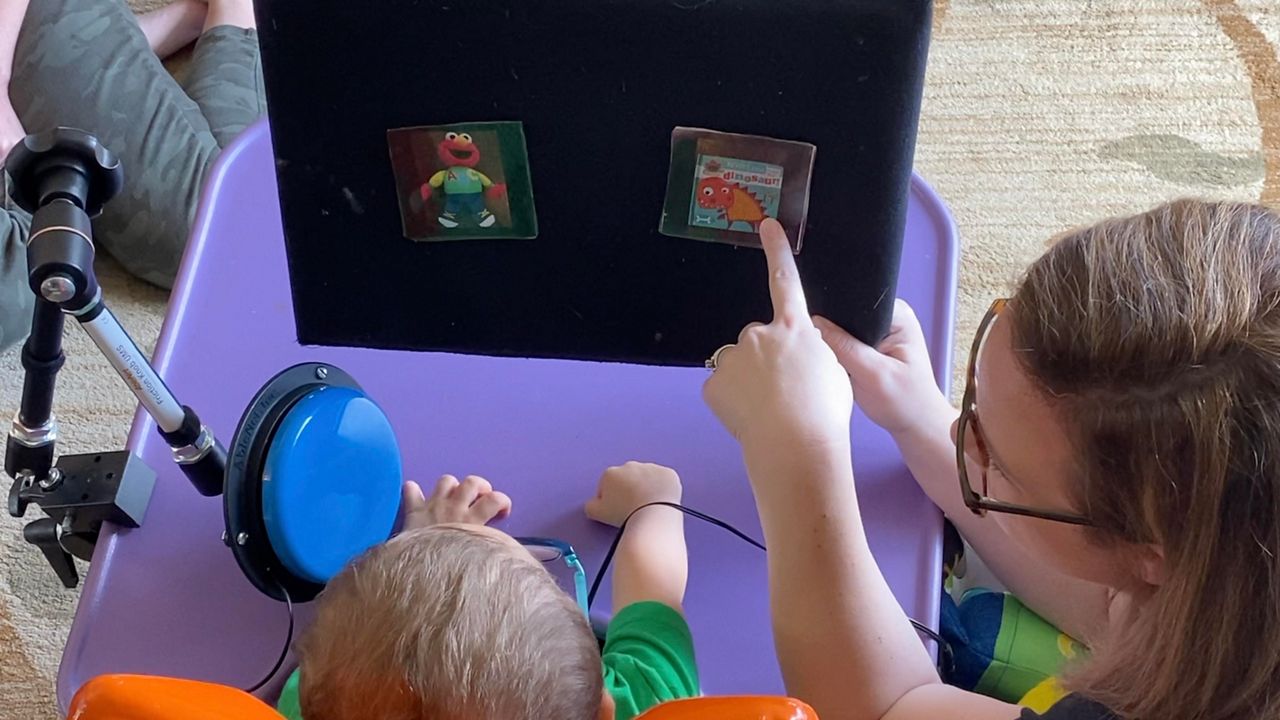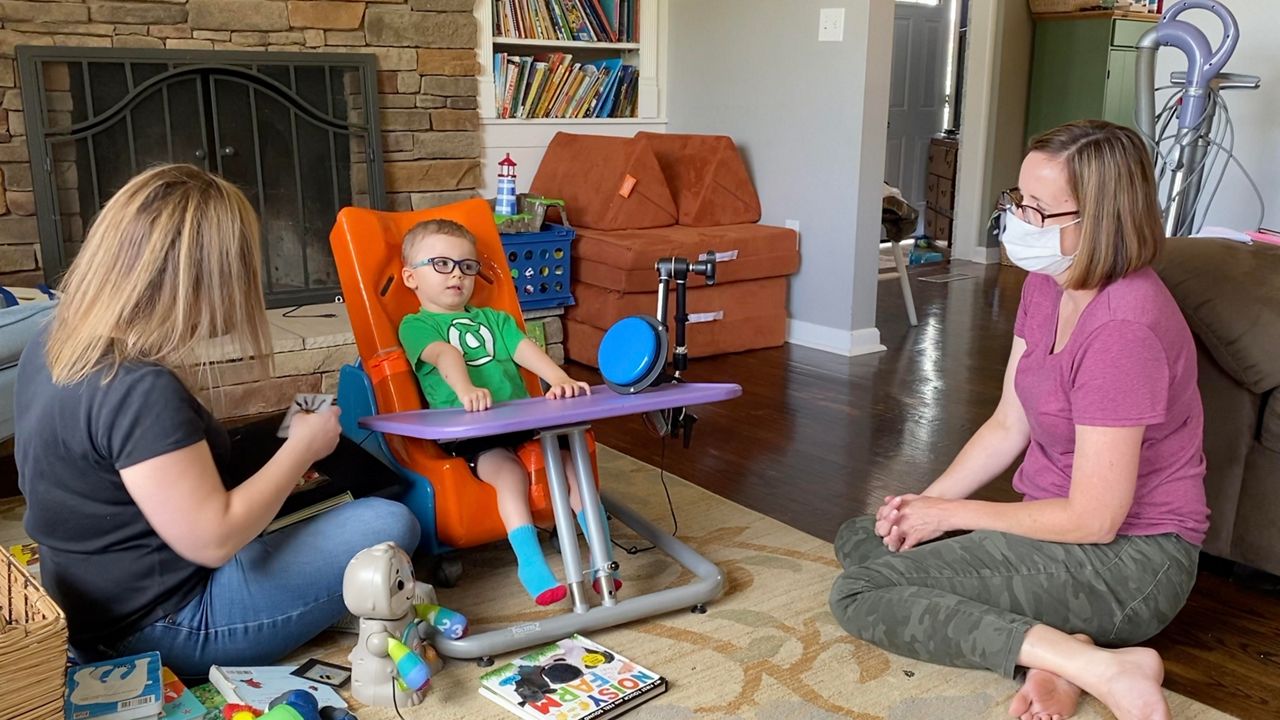VILLA HILLS, Ky. — The new school year presents all kinds of challenges for kids as they head back into classrooms, and for those with disabilities like visual impairments, challenges are amplified.
A new grant aims to make life easier for kids with visual impairments, and their families, in Northern Kentucky.
What You Need To Know
- Visually Impaired Preschool Services, or VIPS, received a grant to help visually impaired kids in Northern Kentucky
- Isaac Burks, one of those kids, has cortical vision impairment after a birth injury
- Through VIPS, Isaac is learning to communicate through picture identification
- Isaac’s parents said they’ve seen great progress, and hope other families can benefit as well
Isaac Burks is one of those kids. Isaac has cerebral palsy. When he was born about two and half years ago, a birth injury gave him brain damage, and ultimately cortical vision impairment.
“He had a lot of brain damage, basically to his gross and fine motor skills. So we knew that he could have some delay in visual aspects,” said his mom, Traci Burks.
The way Isaac sees the world around him is a lot different from other kids his age.

“What he is seeing is kind of delayed of what he’s understanding that he’s seeing,” Traci said.
Isaac’s dad Brandon described it as, “When he first sees something, it’s almost like a kaleidoscope. He just kind of has a lot of different things coming at him. Different colors. And so it just kind of takes a second to filter all of that out and focus.”
Through First Steps of Kentucky, the Burks were connected with Visually Impaired Preschool Services (VIPS).
As the statewide early intervention system that provides services to children with developmental disabilities from birth to age 3, First Steps is one of the many ways children who need help are identified. If a child is already receiving First Steps services, a VIPS teacher can be added to the child's plan and we will provide vision intervention.
Visually impaired teacher Dixie Marz has been with VIPS for 15 years. She works with children like Isaac, who have some vision, and tries to teach them to optimize what they have.
Other kids might have little to no vision, in which case Marz said she might be working with them on pre-Braille skills, or how to walk safely in an environment.
She explained how children learn through their vision, and how important the work she does with visually impaired children can be to their development.
“They use their vision to learn about their environment, especially in those first few years. Your brain’s just rapidly developing. So if you have a child with a vision loss, they might not be getting all that information that they would be getting if they had typical vision,” Marz said.

Marz now comes to work with Isaac in their home two to three times a month.
Since Isaac is not able to communicate verbally, his parents, with Marz’ guidance, have been trying to teach him to communicate with his eyes through picture identification.
“The goal is that he’s able to make an accurate choice using eye gaze, and scanning across a field of whatever is presented,” Marz said.
Traci and Brandon said they’ve seen great progress in the time Marz has been working with their son.
“He used to only prefer his left field. And so when he was really little, he would get stuck to right in the middle, and wouldn’t go past to the right side,” Traci said. "Now, we’ve progressed to where he’s able to look at pictures and identify them, and know that’s what I want to do, that’s what I choose to do. I’m gonna do the book. I never thought, given his diagnosis, we never thought he wouldn’t be able to verbalize things, but it’s great we’re able to communicate in this way, using his vision.”
VIPS serves kids directly from birth to three years old, and then follows up until they’re five-years-old, and transitioning to school.
The two closest VIPS offices are in Louisville and Lexington, with no provider in Northern Kentucky, so Marz has to make the drive to Villa Hills to work with Isaac.
The company just received a $5,000 grant from the Elsa Heisel Sule Foundation for the Early Childhood Intervention Program, which will allow it to help more kids in Boone, Kenton and Campbell Counties. It'll help provide direct service to families in their homes, so they don’t have to drive. Marz said kids learn best in their natural environments.
The Burks said they’re happy more families will have access to what has been life changing for them.
“We probably would be shooting in the dark and just trying to work on our own way of communication. I would never have thought looking at an object would be a way of communication ever in my wildest dreams,” Traci said.
The Burks said they are trying to secure a Tobii Eye Gaze system for Isaac, which is a computer monitor that would sit in front of him. The machine is able to read the child’s eyes and track their gaze. It can then say the words the kid stares at, and eventually help them speak full sentences.
Over 92% of VIPS' work occurs outside of its brick and mortar offices, directly in children's homes throughout the 120 counties in Kentucky and 92 counties in Indiana. The company served 708 children from July 2020-June 2021, with 30 of those children residing in Boone, Campbell and Kenton counties.
Seeing children under the First Steps umbrella allows the company to provide its services at no direct costs to parents since it receives financial reimbursement from First Steps. However, that reimbursement doesn't come close to covering all of its costs, which is why funding from granters is so critical.
“Grant funding allows us to ensure that no child goes without services, even if they do not meet the criteria for First Steps enrollment,” said Kelly Easton, intake coordinator for VIPS.
While the majority of the company’s referrals come from pediatricians, ophthalmologists or hospitals, parents and family members can also refer their child if they suspect a visual impairment. VIPS can assess their child and see if they would benefit from services, and can also ensure the family is aware of the many resources that are available to them from VIPS or other agencies in their area.
Families can reach Easton at 859-685-6716 or keaston@vips.org to learn more.



